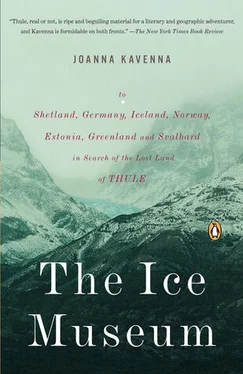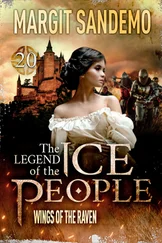FATHOMS DEEP BENEATH THE WAVE
STRINGING BEADS OF GLISTERING PEARL
SINGING THE ACHIEVEMENTS BRAVE
OF MANY AN OLD NORWEGIAN EARL;
DWELLING WHERE THE TEMPEST’S RAVING
FALLS AS LIGHT UPON OUR EAR
AS THE SIGH OF LOVER, CRAVING
PITY FROM HIS LADY DEAR,
CHILDREN OF WILD THULE, WE
FROM THE DEEP CAVES OF THE SEA
AS THE LARK SPRINGS FROM THE LEA
HITHER COME, TO SHARE YOUR GLEE
“SONG OF THE MERMAIDS AND MERMEN,” SIR WALTER SCOTT (1771-1832)
In the quiet hotel room in Rosenkrantz Gate, the pallid morning light began to drift across the room. I heard atonal bells striking eight outside. There were soft sounds from the corridors; people were beginning to walk up and down the stairs. As it grew lighter and lighter I flicked through the pages of a tourist magazine. ‘Come and see the beautiful Holmenkollen ski jump,’ I read, and when I had finished this, I rose and got dressed. I opened the window and peered out, onto the street beneath. The streets were deserted; the city workers had already reached their offices. I leant forward with my elbows on the windowsill. I stared at the sky. It was cloudless; it looked like the day would be fine. The snow lay stacked up in piles on the streets where it had been pushed out of the way of the cars and trams. The snow was muddy, old snow from the winter living on into the spring; it would melt in the next month.
The air was crisp; the sun shone dimly. I walked out onto the streets behind the hotel, away from the centre. I passed through a part of town called Majorstuen and began to stumble slowly uphill. Cyclists slipped along the slope, scuffing their heels on the snow. I moved across the ice, making glacial progress, until I could see the silvery sea below, heavy and becalmed. It was a still day, and the ships were hardly moving at all. I noticed as I walked that there were places where the snow was turning to water and the ice was breaking up. A slight fragrance was rising from the earth, where it had been released from the winter layer of snow: a smell of dust and grass, unfamiliar in the sterile air. Across the fjord, I could see a ferry arriving from Denmark, a huge ship with DANSEBATEN on its side. It sounded its horn.
It took a while to walk up the hill. In the suburbs, the whitewash had made everyone vanish into their houses. A few four-wheel drives ground slowly along the ice roads. I passed through a patch of forest, until I arrived at a main road. I padded on for a few more minutes, and then turned left, sliding across the ice until I reached a row of small brown wooden houses, like chalets. Kicking the snow from my boots, I hammered on the door of one of the houses. There was a movement from within, and then, after a long pause, a wiry, slightly hunched man opened the door. He looked astonished to see me, astonished and not yet delighted.
‘Hallo! Are you from the United States?’ he asked.
‘No, Britain.’
‘Britain! Hah! How many of you are there?’
‘Just me.’
He peered around me to check.
‘You have come up the hill?’
‘I walked from Rosenkrantz Gate.’
‘Yes, of course. Come in, come in.’
He welcomed me into a small, cold room. Everything was made of polished wood. There was a sofa, with a small cuddly pig sitting on it. A few books lay on a table—William James’s The Varieties of Religious Experience , Spinoza’s Ethics , Schopenhauer’s Essays and Aphorisms . The old man read in English, shoring these fragments against his decline. He had a face of crags and lines, chiselled cheeks and a high brow, a shock of grey hair, and pale blue eyes. He was Arne Naess, the ageing conscience of an oil-rich nation, a philosopher almost as old as the century, born the year after Amundsen arrived at the South Pole. He was a philosopher of the pending eco-apocalypse, sitting it out in a snowfield, waiting for the global thaw, the great change to the climate that would destroy everything. Like an environmentalist Cassandra, he wailed his prophecies to the masses, and they carried on driving around in cars, his government continued exporting rivers of oil. This old philosopher had discerned a threat, stretching as far as the empty lands of the north. The wildernesses stood imperilled. Drastic solutions were required, bold definitions: ‘enlightenment,’ ‘apocalypse’—the big guns of social change. Arne had been living in the mountains, trying out the life of a solitary seer, making his philosophy from scraps of Gandhi—‘self-realization’ through universal realization, minimalism, self-discipline. But now he lived in the suburbs of the city, at the edge of the forests.
Arne was wiry and strong, despite his ninety years, lively and eloquent, despite the fact he seemed to have forgotten that I was coming. I removed my shoes, which were damp from the snow. He sat down on the long, low sofa, wearing a snug woollen jumper, looking extremely warm. A low flame crackled in the grate. The wood on the walls and floor was immaculately polished. He gestured to me to sit near him.
‘This is a beautiful house,’ I said, politely.
‘Yes, yes, beautiful. But so expensive to have all this polished wood. It cost a lot. My wife did it all. Beautiful though, I agree. You are kind,’ he said. And then he looked slightly worried, and said: ‘You have something special to talk about?’
There was a note of challenge to his voice. In Norway, Arne was notorious, a national legend. When I said to the hotel manager that I was going to visit him, he had told me that Arne used to climb up the buildings in the University of Oslo. Students would wait for him in a lecture room, and he would appear through the window. I wanted to ask this old man in the thick jumper if it was true, but something more substantial seemed to be required. He had cocked his head to one side, and his eyes had glazed over entirely; he was staring at a stain on the floor.
I had gone to him to mark the parameters of my enquiry: from the explorers struggling towards the frozen ocean to contemporary concerns about the melting of the ice, the loss of Thule. I was talking about remoteness, the changing sense of the limits of the world, and I said that Thule had once been the last land in the north, a beautiful and forbidding place. A wild place.
He interrupted with sudden enthusiasm, smiling as if I had pleased him.
‘Yes!’ he said. ‘Yes, that’s right. I have used the term “free nature”—it’s a grey area in a sense. In Europe, we should not talk about wilderness—because we can never have this again. We cannot talk of wild nature. We can have small patches—I call them patches—of nature that is not obviously dominated by human activity. When I was young, in Norway, there was a real big difference there—you could see people on the coast of Norway sitting and looking into the water—there was so much to see, so much to see. And also the experience of water—I had a great time sitting and looking at tiny waves—very big ones also—but tiny waves, just little wrinkles. I walked into the water, I was amazed at all the living beings I could see—but not today. Yes, everything is dead. All the things are contaminated, all spoilt. But when I was a child, it was amazing, I was amazed. For instance, there would be little flatfish; little flatfish would be getting away when I was nearly stepping on them, these little flatfish used to get under here’—and he pointed to the bottom of his foot—‘finding it was a nice place to hide.’
The flatfish were quite enchanting him, and his face creased into a smile.
‘I found they liked very much that there was some place they could hide, hiding under me, not really understanding what was going on. But anyhow, in my time all children were experiencing the coast of Norway—an enormous coast—standing in water, finding endless interest in the tiny things of nature—and they got a firm . . . what do you call . . . love of nature.’
Читать дальше












